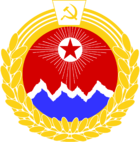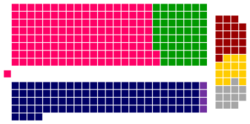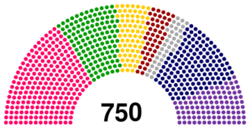The Government of Imperial Lyndonia and Montefalco
| This page is a work in progress by its author(s) and should not be considered final. |
| Parliament of ILAM Blurschtriek | |
|---|---|
| 187th People's Parliament | |
 | |
| Type | |
| Type | Bicameral Multiparty |
| Houses |
Kraignow (Upper House) trans: House of Councillors Pleinow (Lower House) trans: House of Keys |
| Leadership | |
| Prime Minister of ILAM |
Derell Guillory, (Soc-DP2) Since 2020 |
| Consul of the Kraignow |
Anakin Siegfried Quay, (non-partisan during incumbency) Since 2016 |
| Speaker of the Pleinow |
Sybille Nightingale Roux, (non-partisan during incumbency) Since 2020 |
| Structure | |
| Seats |
1,100 total
|
 | |
| Kraignow political groups |
|
 | |
| Pleinow political groups |
Socialist Democratic (230) Communist (47) Confidence-and-supply Green (127) Independent (36) Liberal (140) Conservative (100) Centrist Libertarian (70) |
| Meeting place | |
|
Narschton Palace (Government) Magna Palatium (Parliament) | |
The Government of Imperial Lyndonia and Montefalco, commonly referred to as The People's Government or ILAM Government, is the central government of The People's Republic of Imperial Lyndonia and Montefalco. The People's Government governs mainland ILAM and its satellite territories (3 special administrative regions and 2 autonomous regions). The Government is headed by the President as Head of State and the Prime Minister as Head of Government. The governing framework of the People's Government is the 1922 Davantian Constitution, as amended in 1998 and 2017. The primary feature of the Government is its type being semi-presidential where executive and legislative powers are fused. Interestingly, ILAM also practices a balance of centralization and decentralization making it a quasi-federal nation-state.
Contents
Executive Branch
The executive powers of the People's Government is wielded by the Presidium, which collectively sits as the primary general executive policy-directing and policy-coordinating body. The Presidium comprises the President's Department, Prime Minister's Department, the Departments of Security and State Policy, and the Council of the State. The incumbent members of the Presidium are the following.
| Name | Position | Office | Notes |
|---|---|---|---|
| Albert Quay | Great Leader | President's Department | The Great Leader is considered as an "institution of the state", therefore only ceremonial. |
| Lucas Obrero | President | President's Department | |
| Derell Guillory | Prime Minister | Prime Minister's Department | |
| Martha Santiago | Deputy Prime Minister | Prime Minister's Department | |
| Michael Jean Lannister | Secretary of State for Defence | Departments of Security and State Policy | |
| Angelique Huff | Secretary of State for Interior | Departments of Security and State Policy | |
| Juliet Lesley | Secretary of State for Foreign Affairs | Departments of Security and State Policy | |
| Maximilian Sanders Baldwin | State Counselor | Council of the State | |
| Leonid Vladimir Ilyich | State Counselor | Council of the State |
A person appointed by the President as Custodian and Spokesperson serves as the chief administrative, operations, and communications officer of the Presidium. The Custodian and Spokesperson is granted the rank of Secretary of State. The current Custodian and Spokesperson is Frida Rochster, former First Chancellor of then Office of the Presidential Regent. The President's and Prime Minister's Departments are assisted each by a Chancellor who shall wield the powers of an administrative head of office. The incumbent First Chancellor of the President's Department is Jane Polk and the Second Chancellor of the Prime Minister's Department is Frederick Chester. The Presidium also convenes the Plenum, a biennial assembly of all citizens through which they may directly craft a policy to be sent to the Presidium for resolution. The Chamber of Ministers is the collection of members of parliament sitting as officials of the People's Government. The Prime Minister chairs the Chamber of Ministers. Positions and ministries organized and included in the chamber may be changed by the Prime Minister to better serve the people. The list of ministers can be accessed in the official NationStates page of ILAM.
Local executive power is vested upon the Chief Minister for autonomous regions, Regional Commission for special administrative regions, Governor for the provinces, the Mayor for the cities and municipalities, and the Local Council for the counties. All local chief executives are under the supervision of the Presidium.
Legislative Branch
Judicial Branch
Political Groups in ILAM
For information on the ruling party, see Socialist Democratic (Soc-DP2).
The existing political parties in ILAM are the listed in the table below.
| Party | Seats Commanded | Parliamentary Position |
|---|---|---|
| Socialist Democratic | 376 | Government |
| Communist | 67 | Crossbench Confidence-and-supply |
| Liberal | 240 | Main Opposition |
| Conservative | 104 | Supporting Opposition |
| Libertarian | 84 | Crossbench |
| Green | 181 | Coalition Government |
| National Socialist | No Seats | No Representation |
| UFSI | No Seats Banned from Election |
No Representation |
| GPD | No Seats Banned from Election |
No Representation |
Due to the country's hybrid system of voting, candidates independent of any political party are able to run for office. Currently, there are 48 sitting Independent Members of Parliament in both houses.
